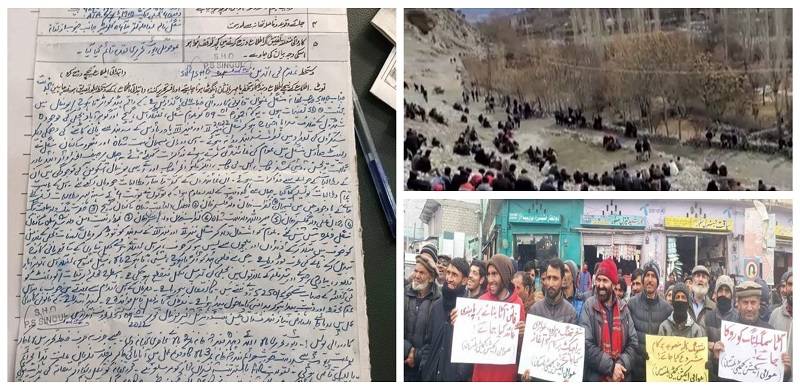
Peaceful protestors in Gilgit-Baltistan who had assembled to demand an end to long hours of load-shedding were reportedly arrested under anti-terrorism charges, according to the first information report (FIR).
The FIR that was shared on Twitter by a Gilgit Baltistan activist reads that the protestors had been apprehended after they became violent, and claims that officials had tried to comply with their demands.
https://twitter.com/leftitweets/status/1481211194321031171
Protests emerged across Gilgit-Baltistan recently against rising utility and food prices, along with shortages of both. On Tuesday, protesters blocked the streets of Gilgit city, saying that they were facing a severe shortage of wheat flour and high prices of other food products.
In Skardu, the Awami Action Committee (AAC), a Gilgit-Baltistan-based organized, reportedly staged a protest against load-shedding as well as the shortage of food items, both concerns which have been exacerbated by heavy snowfall and freezing temperatures in the region.
Residents of Ghizer in western Gilgit-Baltistan have also demonstrated against unannounced load-shedding, assembling in weather reaching -21 degrees Celsius to block major roads across the district.
"We are giving the water, used for land, to powerhouses only for electricity generation. The least you can do for us is provide electricity," said one of the protestors in Ghizer.
Gilgit-Baltistan is an administrative territory of Pakistan and, as such, has no representation in the National Assembly, nor do residents have the right to vote, despite the fact that they pay federal taxes.
Earlier this month, similar demonstrations took place in Bannu and Lakki Marwat in Khyber Pakhtunkhwa, with women taking to the streets to protest excessive load-shedding and the surging prices of gas and electricity. The women in Lakki Marwat burned their utility bills to show their outrage.
The FIR that was shared on Twitter by a Gilgit Baltistan activist reads that the protestors had been apprehended after they became violent, and claims that officials had tried to comply with their demands.
https://twitter.com/leftitweets/status/1481211194321031171
Protests emerged across Gilgit-Baltistan recently against rising utility and food prices, along with shortages of both. On Tuesday, protesters blocked the streets of Gilgit city, saying that they were facing a severe shortage of wheat flour and high prices of other food products.
In Skardu, the Awami Action Committee (AAC), a Gilgit-Baltistan-based organized, reportedly staged a protest against load-shedding as well as the shortage of food items, both concerns which have been exacerbated by heavy snowfall and freezing temperatures in the region.
Residents of Ghizer in western Gilgit-Baltistan have also demonstrated against unannounced load-shedding, assembling in weather reaching -21 degrees Celsius to block major roads across the district.
"We are giving the water, used for land, to powerhouses only for electricity generation. The least you can do for us is provide electricity," said one of the protestors in Ghizer.
Gilgit-Baltistan is an administrative territory of Pakistan and, as such, has no representation in the National Assembly, nor do residents have the right to vote, despite the fact that they pay federal taxes.
Earlier this month, similar demonstrations took place in Bannu and Lakki Marwat in Khyber Pakhtunkhwa, with women taking to the streets to protest excessive load-shedding and the surging prices of gas and electricity. The women in Lakki Marwat burned their utility bills to show their outrage.

